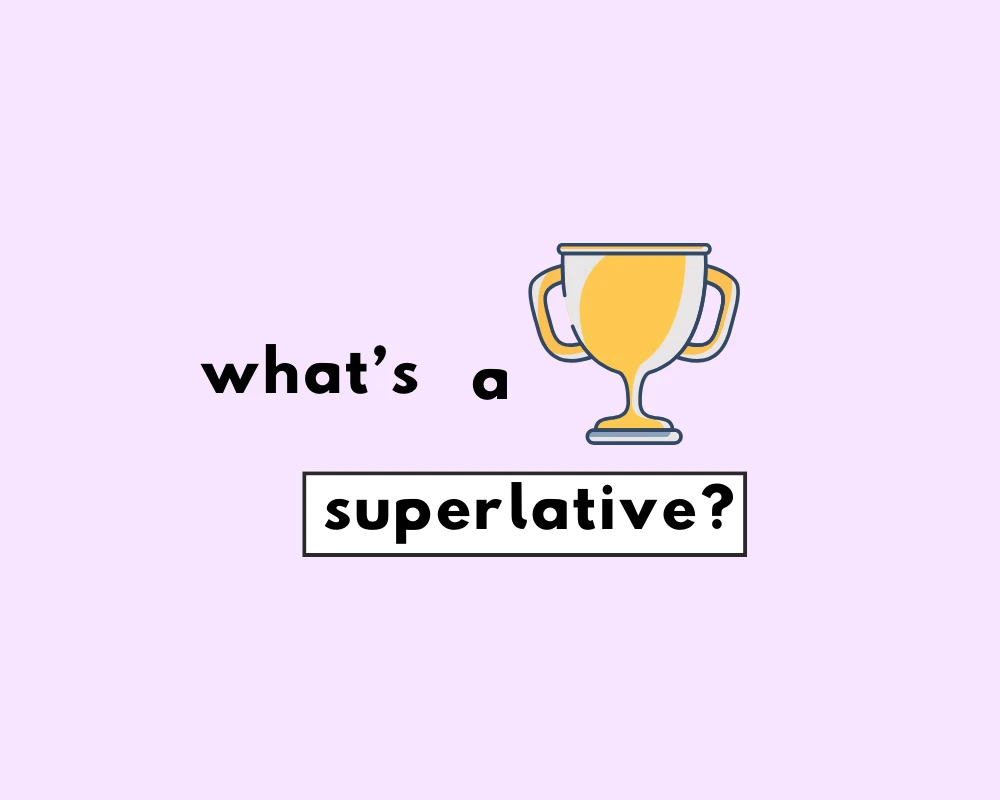Contents
Toggle
What’s a superlative?
Which subject is your weakest?
What’s the most difficult part of studying English?
What are some of your best childhood memories?
Do you ever ask or get asked these types of questions? Questions that probe on who or what you think is the “most” or “least” of something, whatever that “something” may be? They’re the classic yearbook graduation questions we’re all familiar with (e.g., “cutest couple“, “most likely to succeed in everything“, “biggest over-achiever“).
As you can probably guess from this article’s title, the words in bold are examples of superlative adjectives in English. Superlatives might be the funnest part of grammar-let’s explore.
Meaning of the word “superlative”
The best way to understand a word or term is to look to its language of origin (a free bonus tip, and a valuable one at that!) Superlative entered English from the Old French superlatif, meaning, “absolute, highest; powerful; best”. As an adjective and describing word, superlative still retains this meaning of saying something or someone is of, “very high quality”, or “surpassing all others; i.e., supreme“, in whichever regard is relevant to the context (from Merriam-Webster).
For example, if your teacher tells you that your work is “superlative“, they’re using it as an adjective to say it’s supreme or top-notch (or Jim-dandy!). As a term in grammar, superlative adjectives denote something as “the highest degree of comparison (of adjectives and adverbs, indicated by –est or more), according to Etymonline.
Highest degree of comparison is in italics since it’s a clunky term, but to really grasp the idea of superlative adjectives it’s crucial to understand what this means. Let us explore, below.
“Superlatives” vs. “comparatives”
Compare how the adjective “generous” figures into each of the sentences.
Simple: Colin is generous.
Comparative: Colin is more generous than Owen.
Superlative: Colin is the most generous person I know.
The first sentence tells us that the person (Colin) has the trait of being generous, but without specifying to what degree or extent they are generous. This is the simple form of the adjective; it simply states someone or something has some trait or quality. It’s also the form of the word that appears when you go to look it up in the dictionary.
The second sentence, ‘Colin is more generous than Owen’, tells us that Colin, when compared with Owen, has more of the quality of generousness or generosity.
Comparatives, we can then say, compare two people, objects or things with each other, and says which has “more” or “less” of a trait. Comparatives either end in –er, or follow “more“, unless it’s an irregular comparative form.
The third sentence shows the superlative, “most generous“, to say that something has the greatest in quantity, extent, or degree of a trait compared to anything or anyone else.
To compare more than two things with each other, and to say which has the most of a trait, we use the superlative form. Some adjectives form the superlative by following the adverb “most”, or they add –est (unless they’re irregular).
Formation of superlative adjectives
To be a proficient English speaker and writer, it’s necessary to know the proper forms superlatives take. This list breaks it down, for your convenience.
Single-syllable adjectives
Single-syllable adjectives add –est to form a superlative:
- cool ➜ coolest
- small ➜ smallest
- short ➜ shortest
- tall ➜ tallest
Adjectives that end in “e” add –st:
- cute ➜ cutest
- free ➜ freest
- late ➜ latest
- large ➜ largest
Single-syllable (consonant-vowel-consonant)
Adjectives that are one-syllable and have a consonant–vowel–consonant pattern, double the last consonant and add –est.
- big ➜ biggest
- hot ➜ hottest
- wet ➜ wettest
One or two syllables ending in –y
Adjectives with either one or two syllables replace y with i and add –est:
- happy ➜ happiest
- silly ➜ silliest
- dry ➜ driest
Two-syllables ending in –er, –ow, or –le
Adjectives with two syllables that end in –er, –ow, or –le add –est without changing its initial spelling. Two-syllable adjectives that end in –le just add –st, (there’s no need to add a second e).
- clever ➜ cleverest
- shallow ➜ shallowest
- simple ➜ simplest
Long adjectives follow “most”
Two-syllable adjectives that don’t end in “y“, and adjectives with three or more syllables follow “most”. E.g., “most careful“; “most boring“; “most patient“.
Irregular superlatives
Those familiar with their irregular noun and verb forms will be no stranger to these idiosyncrasies in English. Adjectives also have an irregular form, and don’t follow the so-called “conventional” rules when switching from its base to comparative to superlative form. Here’s a rundown on these irregularly formed adjectives:
| Base adjective | Comparative | Superlative |
| good | better | best |
| bad | worse | worst |
| little | less | least |
| much | more | most |
| far | further/farther | furthest/farthest |
Synonyms of superlative
- A1
- bang up
- blue-chip
- dope (slang)
- first-rate
- fabulous
- fantastic
- top-notch
- five-star
- marvelous
- stellar
- fantabulous
- top-of-the-line
Read on other topics in grammar
- Who’s vs. Whose?
- They’re vs. Their vs. There?
- Whether vs. Weather: Which is Correct?
- Allude or Elude?
- Elicit or Illicit?
- Past or Passed?
Sources
- “Jim-dandy.” Merriam-Webster.com Dictionary, Merriam-Webster, https://www.merriam-webster.com/dictionary/jim-dandy. Accessed 15 Dec. 2023.
- “Superlative.” Merriam-Webster.com Dictionary, Merriam-Webster, https://www.merriam-webster.com/dictionary/superlative. Accessed 15 Dec. 2023.
- “Most.” Merriam-Webster.com Dictionary, Merriam-Webster, https://www.merriam-webster.com/dictionary/most. Accessed 15 Dec. 2023.
- “More.” Merriam-Webster.com Dictionary, Merriam-Webster, https://www.merriam-webster.com/dictionary/more. Accessed 15 Dec. 2023.










